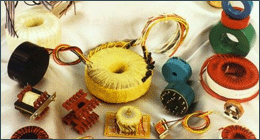A wide array of materials are used to construct toroidal transformers. Each material type has different characteristics, which means materials should not be used interchangeably for various products and applications. Choosing an optimal core material helps to ensure strong magnetic flux and solid performance. After determining the core material, you must focus attention on custom coil winding.
The core type has a profound effect on the functioning of a transformer. Of all the materials used to construct cores, there are three that are most used. These three materials include:
- Solid iron or steel – Annealed and solid steel/iron used to be the number one choice because the core creates a strong magnetic field. It is important to keep in mind that although the magnetic field is strong, this material produces Eddy currents that can make a transformer ineffective. They are also known to create heat that will affect the overall performance of the toroid. With adequate toroidal coil winding, these problems can be significantly reduced.
- Laminated silicon/steel – These are thin strips of silicone alloy stacked together to be used as a core. You will commonly find these cores inside 50, 60, and 400 Hz toroidal transformers. Custom coil winding is based on the needs of the transformer. This material has efficient magnetic propagation that is known to reduce Eddy currents and heat dissipation.
- Amorphous steel – This material is considered extremely thin. It typically uses one building transformer to function in high to mid frequencies. Eddy current flows are drastically reduced when using these materials within designated frequencies. If you need a medium frequency transformer that is extremely efficient, you should consider a toroid.
Toroid Transformer
- Design Elements & Workings of a Toroidal Transformer
Custom coil winding is done in highly compact configurations to allow toroids to function differently depending on the desired application.
- Frequently Asked Questions for Designing Toroids
- Learning About Toroids and Custom Coil Winding

